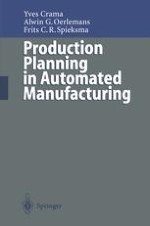1996 | OriginalPaper | Buchkapitel
Minimizing the number of tool switches on a flexible machine
verfasst von : Dr. Yves Crama, Dr. Alwin G. Oerlemans, Dr. Frits C. R. Spieksma
Erschienen in: Production Planning in Automated Manufacturing
Verlag: Springer Berlin Heidelberg
Enthalten in: Professional Book Archive
Aktivieren Sie unsere intelligente Suche, um passende Fachinhalte oder Patente zu finden.
Wählen Sie Textabschnitte aus um mit Künstlicher Intelligenz passenden Patente zu finden. powered by
Markieren Sie Textabschnitte, um KI-gestützt weitere passende Inhalte zu finden. powered by
A central problem of tool management for flexible machines is to decide how to sequence the parts to be produced, and what tools to allocate to the machine, in order to minimize the number of tool setups. The problem becomes especially crucial when the time needed to change a tool is significant with respect to the processing times of the parts, or when many small batches of different parts must be processed in succession. These phenomena have been observed in the metal-working industry by Hirabayashi, Suzuki and Tsuchiya (1984), Finke and Kusiak (1987), Bard (1988), Tang and Denardo (1988a), Bard and Feo (1989), etc. Blazewicz, Finke, Haupt and Schmidt (1988) describe for instance an NC-forging machine equipped with two tool magazines, each of which can handle eight tools. The tools are very heavy, and exchanging them requires a sizeable fraction of the actual forging time. Another situation where minimizing the number of tool setups may be important is described by Förster and Hirt (1989, p. 109). These authors mention that, when the tool transportation system is used by several machines, there is a distinct possibility that this system becomes overloaded. Then, minimizing the number of tool setups can be viewed as a way to reduce the strain on the tool transportation system. Bard (1988) mentions yet another occurrence of the same problem in the electronics industry. Suppose several types of printed circuit boards (PCBs) are produced by an automated placement machine (or a line of such machines).
